REPORTER’S DIARY: No ‘African time’, conflicting seat numbers — riding the Lagos-Ibadan train service
As I prepared to leave for the Mobolaji Johnson Station in the Ebutte Metta area of Lagos that Wednesday morning, the heavy rainfall that blasted through the roof and swept everything on its path made me had a second thought, not sure it was also going to sweep me off if I venture out. But I have been planning for the trip and further delay could make me miss the train scheduled to depart Lagos for Ibadan, Oyo state capital, by 8:00 am. So, I dashed out into the rain, my clothes and body drenched almost immediately.
As I arrived at the train station in Ebutte Metta, I made my way to the counter to purchase the standard ticket which costs N2,500. The two other categories of tickets were the business class which goes for N5,000 and that of first-class which costs N6,000. After presenting my identity card and providing other personal details, I got my ticket, ready for the trip on one of Nigeria’s most modern train services.
NO ‘AFRICAN TIME’
My seat at coach 4 was numbered 34 and surrounded by passengers who, like me and many of the others in the nine coaches, also had the standard ticket.
The ticket came with some level of comfort in the coach which had a capacity of 88 passengers, functional air conditioning, charging points, a television, bag placement sections and a toilet used by both male and female passengers.
At 7:57 am, a woman’s voice came ringing through the sound system, alerting those at the station that the train was “about to depart Mobolaji Johnson Station and it is taking us to Chief Obafemi Awolowo Station in Moniya, Ibadan.”
“If you’re not travelling with this train and you’re still on board, kindly make your exit,” the operator added.
True to the schedule, the train roared to life and commenced the journey at exactly 8:00 am, coming as a surprise to some passengers as some had expected the popular “African time” phenomenon in which schedules are usually delayed for no good reason.
“We are now departing Mobolaji Johnson station,” the sound system came alive once again. “Our next stop is at Prof Wole Soyinka station, Laderin, Abeokuta. Thank you for choosing Nigeria Railway.”
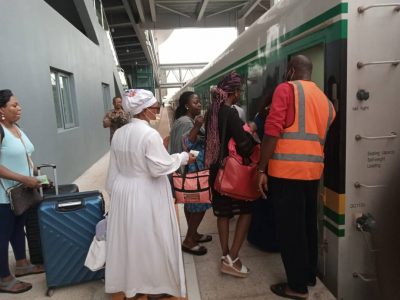
At 8:10 am, an official with the Nigeria Railway Corporation (NRC) announced that tickets will be checked as the journey progresses, after which a staff of the corporation started checking the tickets.
Accompanying her was an official of the Man O’ War, who was on the trip alongside some security operatives from the Nigeria Police Force and the Nigeria Security and Civil Defence Corps (NSCDC).
More than one hour down the line, at 9:08 am, the train stopped at Funmilayo Kuti station, Papalanto, for some passengers to disembark, stopping next at Wole Soyinka station, Laderin in Ogun state at about 9:30 am.
“We are now arriving at Prof. Wole Soyinka station. You can make your exit through coach number 3 and 7. Thank you for choosing Nigeria Railway,” she said.
CONFLICTING SEAT NUMBERS, FALSE INFORMATION
One of the challenges during the trip that lasted two hours and forty minutes was the conflicting seat numbers provided to passengers. Shortly before the trip commenced, an elderly woman approached me and claimed that I was on her allocated seat. She showed me her ticket and the number written on it. To our surprise, we had the same number — coach 04, seat 34.
It became clear that the manual issuance of tickets had resulted in conflicting seat numbers given by the NRC officials.
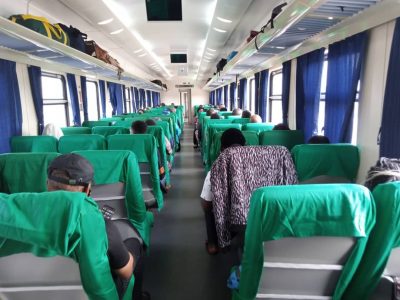
Another challenge was the case of false information by an NRC official. At 10:00 am, the female announcer said, “we are now arriving at Chief Obafemi Awolowo station in Moniya, Ibadan”. The announcement surprised passengers who had expected the trip to last more than two hours.
But as they prepared to exit the coach, the train refused to stop. Alas, the announcer had provided false information — the train was at the time arriving Omi-Adio station and not Moniya.
“We sincerely apologise for the misinformation,” the announcer pleaded some minutes later, with the train eventually reaching Moniya at 10:40 am.
NO FIRST CLASS TICKET FOR IBADAN TO LAGOS RIDE
I had planned to take a first-class ticket for the Ibadan-Lagos trip. But my hopes were dashed when I proceeded to book a seat on the second (and last) trip of the day scheduled for 4:00 pm. At the counter, I was told there was no first-class ticket for the return ride to Lagos.
“On this train, there are three business class coaches and the remaining ones are for standard class. But if you were here in the morning, you would have been able to travel on the first-class coach,” the male attendant said.
Armed with the N5,000 business class ticket, I made my way to the first coach to join other passengers for the trip which commenced at 4:00 pm.
With the increase in ticket price came with more comfort in the business class coach which had 56 passengers, compared to the 88 seats on the standard ticket coaches. You also have access to other things including water.
We got back to Lagos at 6:35 pm, five minutes more than the train had arrived at the station in Ibadan — indicating some five minutes difference from the first trip.
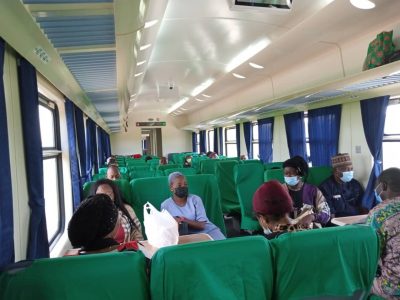
HOW LONG WILL THIS COMFORT LAST?
During the two trips, some passengers chatted about their hopes and fears about how long the comfort that comes with the train service would last. Their worry was, perhaps, as a result of the poor maintenance culture prevalent for government facilities in Nigeria. In fact, some passengers suggested that the trains be handed over to a private corporation.
The federal government had already spoken about the big plans it has for the train service, with Rotimi Amaechi, minister of transportation, assuring that the number of trips on the route would increase from two to 16 daily by the end of 2021.
As I disembarked from the train, I couldn’t help but imagine what the situation would be like then — especially the ensuing comfort for Lagos residents who could be relocating to Ibadan to avoid spending much of what is left of their lives in the road traffic that keeps getting worse.
Well, I am back to the same Lagos, about to head into the evening traffic which I had viewed from the comfort of the train through the windows that line up the coaches.
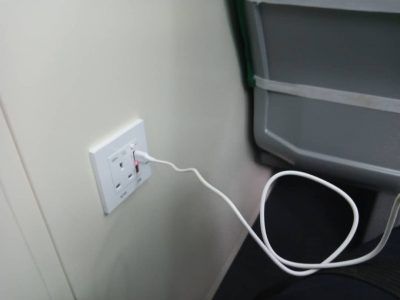
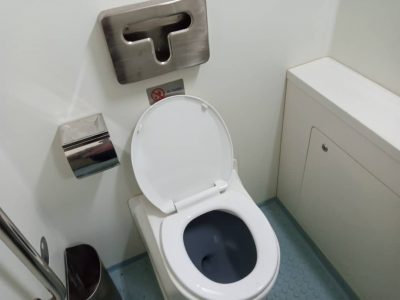
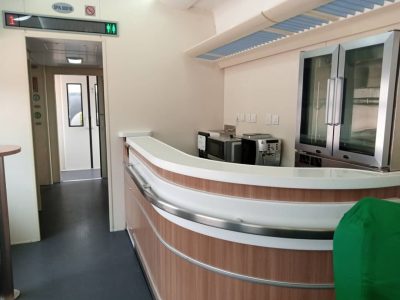
(The Cable)





